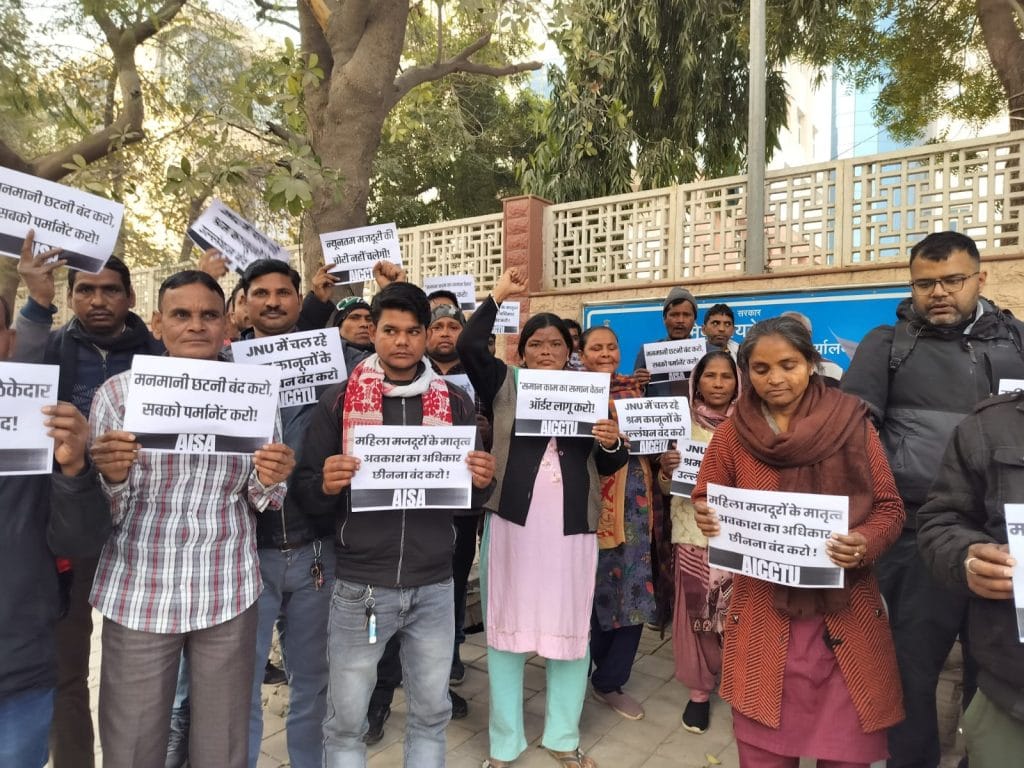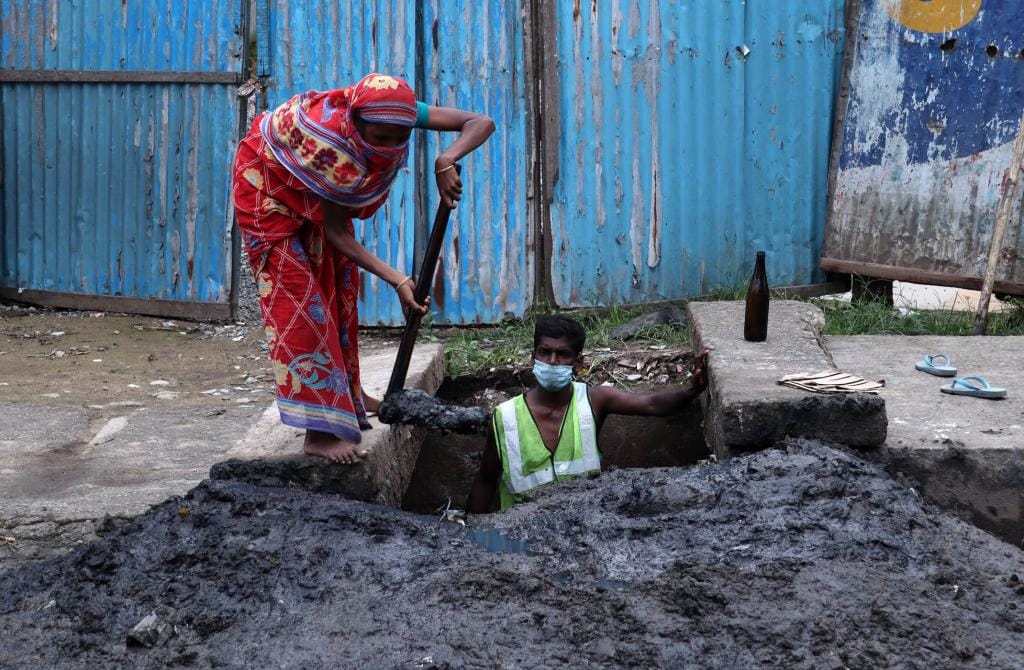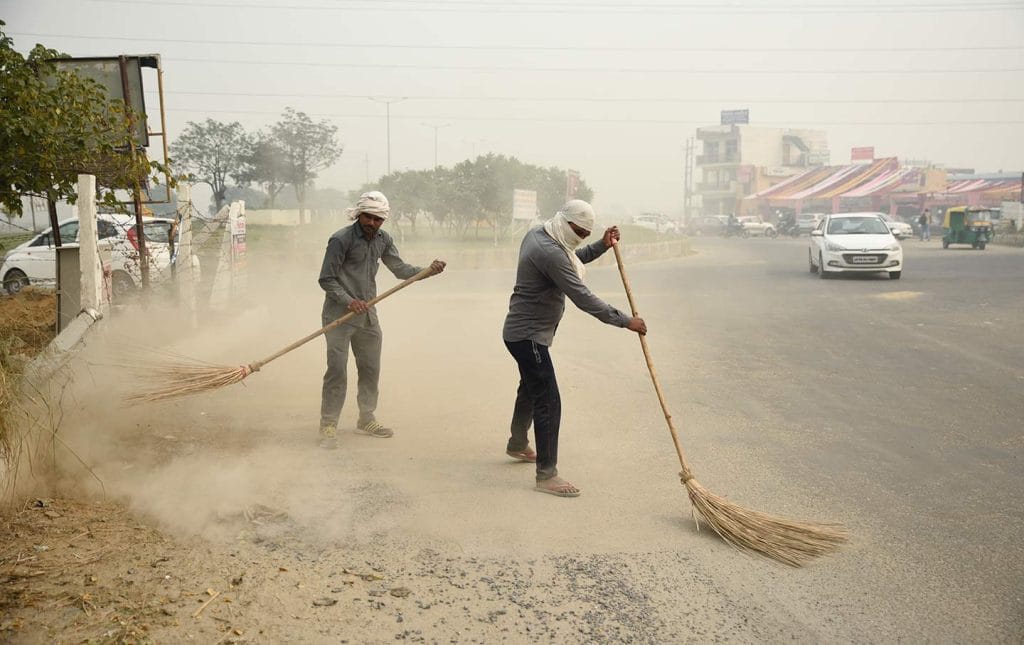In developing urban cities like New Delhi, caste and its stigmas function through its markers symbolically. Sanitation work in India includes an array of work including sweeping, cleaning latrines and sewers, solid waste management, cleaning of public toilets and drains, handling of municipal waste and even further. Dalberg Associates in a study conducted in 2017 revealed that there are 5 million sanitation workers in India working under nine broad categories. The nature of the job is such that it results in deaths and medical conditions due to exposure to septic waste, human waste and the absence of mechanisation of the work.
There has been a new trend of ‘contractual labour,’ where the workers are appointed through private contractors. While the means of appointment have changed over the years, the caste factor continues to dominate the scenario. A majority of people engaged in sanitation labour belong to the Dalit community facing everyday violations of their dignity and human rights.
Across the nation systems of the proxy, ‘badli’ or ‘ewaj,’ are also frequent where savarna bags the government-appointed jobs of sanitation workers and lowered caste communities do the job for half the pay without any medical facilities. Moreover, the system of contractual employment has further jeopardised the livelihood of these sanitation workers threatening the possibility of a long-term job. However, despite these asymmetrical power structures, sanitation workers have unionised across the country to protest against the unfair treatment which has become their everyday reality.
The recent workers’ strike at Jawaharlal Nehru University
While the city of Delhi was lighting with the lamps of Diwali, the sanitation workers of Jawaharlal Nehru University, New Delhi struggled to claim their minimum labour rights. The Eight-day-long strike continued as waste accumulated throughout the esteemed campus circulating a smell that reminded people of the alienation of labor in a quasi-capitalist economy. The protest began when the JNU administration refused to give the rightful Diwali bonus to more than 200 contractual workers who are a part of the flagship organisation All India Central Council of Trade Unions (AICCTU).

The strike began when Dalit women working as solid waste management workers started boycotting their work against the obliviousness of the JNU administration-company nexus towards the rightful bonus of the workers. The representatives of the company, Rakshak Securitas Pvt. Ltd in a derogatory act told the workers that Rs. 50-100 can be given to workers. As the movement strengthened contractual workers across the campus united to ask for the provision of salary slips.
‘Legislative failure’ in sanitation worker rights
Surya is a PhD Scholar in the School of Labour Studies and an active member of All India Central Council of Trade Unions (AICCTU), the workers’ wing of the Communist Party of India- Marxist-Leninist since 2017. He highlighted how there is a ‘legislative failure,’ in the implementation of the rights of contractual workers in India. In JNU these workers have been working here for more than 25 years in departments like sanitation, horticulture, housekeeping and more.
He cited that the Payment of Bonus Act 1965 is being severely violated in contractual employment even in institutional settings. According to the Act, the employer must pay a minimum of 8.33 per cent of an employee’s salary during the accounting year. This must be within the first eight months of the accounting year. He mentioned how the workers are coaxed with a meagre sum of three-four thousand from the company fund violating the Payment of Bonus Act. The rightful bonus is equivalent to a one-month salary which is constantly being denied.
In addition to these denied rights, the workers of these educational institutes are working in miserable conditions. The safai karamcharis begin their days by cleaning the carcasses of toilet waste.
Surya mentioned that the administration declined the bonus on the premise that it is a ‘non-profit organisation.’ On 22nd October AICCTU took a bus filled with workers to the Labour Commission office. The proposal was that the company can provide the bonus which can be reimbursed by the principal employer. However, as the dissatisfaction in the workers grew it turned into a resistance movement. Gradually the number of workers grew, increasing from 20-25 to 200 people. He also mentioned that the representative of the Labour Commission in their report wrote that there is no demand for bonuses nor is there any such strike in JNU.
As the agitation grew in scale the workers started to ‘militate,’ against the administration. In a march through the various esteemed centres and hostels, the workers started upturning the garbage boxes spreading litter. The workers claimed that they are constantly being invisibilised. Surya also threw light on the non-planned expenditure fund that is reserved for emergency purposes. However, these expenses are not available in public view either.
Student-worker unity in educational institutions
The report found that diversity in educational institutions is critical to student-worker solidarity. Senior residents across the campus have put forth that the implementation of common university entrance tests has diluted the inclusive makeup of the student demography. Surya added, ‘The changes in the education policy after the 1990s enabled the marginalised communities of society to reach institutes like JNU for higher studies.’

Empathy is critically absent in the students pursuing higher studies creating a rift between theory and praxis. Vice Chancellor Dhulipudi Pandit said on her visit to the strike that the bonus cannot be given because the fees cannot be increased for students. Such comments by those in power depict that they are trying to create a binary between the welfare of the students and those of the workers. However, resistance against the power structure is always a possibility.
A mess manager named Abhishek (a category often considered apart from the workers) of Lohit Hostel who was active throughout the strike was arbitrarily terminated by the administration-company nexus post the strike. The decision was sternly resisted by the student-led hostel committee through a plea to the warden. Such examples of student-worker solidarity are beacons of light in dark times.
Solidarity and unionisation among sanitation workers
Surya perceives that ‘unions come together only in times of crisis. Samsung workers, the BBMP contractual workers of Karnataka, Maruti. They know that unionisation doesn’t guarantee rights but the fight is with a class consciousness or political consciousness. The leaders of trade unions are pivotal in the development of such a consciousness.’ Rather than a top-down approach AICCTU is known for a more democratic means of decision-making where the workers are aware of the consequences of strikes and protests. Unionisation ensures the representation of the workers in legislation on their livelihood.

It was only when the workers began to militate through waste that the administration responded to the demands of the workers. In a meeting conducted between various authorities, the President of the student union and representatives of the trade union, the administration said that a meagre amount could be given as a bonus but only to the solid waste management workers. In an act of solidarity, the solid waste management refused the offer. The fight continued with the demand for change in the clause of the tender adding the provision of bonus. However, there has been nothing provided in return. While the ostracisation continues through various means the workers stand united to resist any injustice and are determined to claim their rightful bonus next year.
The strike is a reminder of the juxtaposition of oppression in the very spaces which critique its mechanisms. The violation of the rights of workers in institutional premises and elsewhere is an indicator of key gaps in policy implementations like the Payment of Bonus Act. This struggle of the workers to get their rightful share of the Diwali bonus draws in greater implications regarding dignity, equal treatment, and recognition of their labour.
The strike brings out the necessity for increased unionisation and class consciousness so that justice and fair treatment are meted out to these ostracised workers. Such resistance movements re-instill a sense of faith in the democratic spirit of institutional spaces which can harness greater changes during oppressive regimes.
About the author(s)
Anchal is a writer, poet and spoken word artist based in New Delhi. Her works have been published on various platforms, including Enroute Indian History Blogs, Indian Review E-Journal and department and annual magazines of Miranda House, Kirori Mal College and Gargi College. Currently, she is pursuing an MA in English at Jawaharlal Nehru University, New Delhi and loitering around the city.





